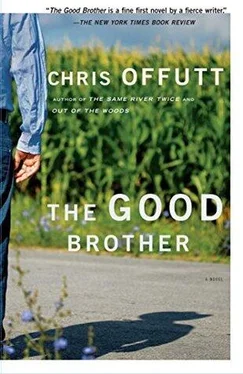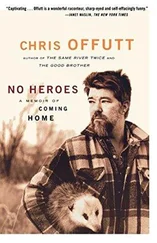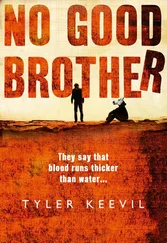He paid and walked to his Jeep. West of town he parked at a tire store, surprised by the line of people. There were three clerks, two men and a woman, and when it was Joe’s turn, the woman stepped forward. Her snap-front shirt was embroidered with roses.
“Busy, ain’t it,” he said.
“Weather does that.”
“Weather?”
“It’s snowing up high. Road to Lolo was a mess this morning. I passed two pileups on the way in.”
“Not too bad now, is it.”
“I’m not driving to work now, either.”
“I guess not,” Joe said. “I need four new tires.”
“Who doesn’t.” She laughed. “What are you driving?”
Joe gestured through the plate-glass window. He wasn’t sure what to call it — a Jeep or a Wagoneer, a car or a truck.
“That blue rig?” she said.
“Yup.”
“Will you be driving snow, gumbo, or highway?”
“I’m not exactly sure what gumbo is.”
“If you don’t know, you aren’t driving it. Snow or highway?”
“Just regular road, I reckon,”
She came around the counter and rolled two tires off a rack. He admired the ease with which she handled the heavy rims. He had never bought new tires before and she patiently explained variations in width, tread, and grip. After twenty minutes, he bought a set and waited in a small room while the mechanics switched the tires. Three other men were there.
“Snowing up high,” Joe said. “That Lolo road was a mess this morning,”
No one looked at him.
“Good for the tire business, I guess,” he said.
The man sitting directly across from Joe lowered his head in a single slow nod and looked away. In Kentucky the men would be hunched forward, discussing weather, dogs, and tobacco prices. These men maintained a studied effort to occupy their own space.
When a mechanic drove the Wagoneer to the lot, Joe returned to the office and settled his bill. A burly man in a short-brimmed pearl Stetson was talking to the same woman who’d helped Joe. The man became confused by the variety of options. It seemed to annoy him that a woman knew more than he did about truck tires. He raised his voice and spoke slowly to her, the same way people in Lexington had spoken to Virgil when they thought he was a dumb hillbilly.
The woman stepped backward and began to nod. A male clerk took over and the woman began anew with an Indian couple. They listened carefully and asked many of the same questions as Joe.
He paid cash and received his change. The woman in line behind him was nearly fifty, but was dressed like a college student. She reminded Joe of a woman from the hollows at home who’d moved to town and married a doctor.
“I feel sorry for that gal,” she said. “Don’t you?”
“Who,” Joe said.
“Her.” She gestured to the saleswoman talking to the Indian couple about tires. “It’s just a shame she has to spend her time educating those people.”
The man behind the counter gave Joe a receipt.
“They’re from deep on the Rez,” he said. “Probably the first time they bought new tires in their life.”
“I don’t guess they’ll pay with a credit card,” she said.
“We got all kinds of payment plans,” the clerk said. He tapped the bald spot on the back of his head. “See that? It’s from the tipi flap hitting the back of my head sneaking in and out at night.”
Joe looked from one to the other, unsure of what to say. They had taken him for a Montanan and he was pleased until he realized that their mistake was based on his skin. As he left, the saleswoman began to raise her voice and speak slowly to the Indians.
He drove to his cabin and spent the afternoon watching squirrels work like ants, dragging pine cones the size of their bodies to hideouts in the woods. Instead of dusk, the light simply ceased. He built a fire and stood in the middle of the room with a blanket over his shoulders. The radio emitted fuzzy static across the dial. He wished he could get religion. People at home took it up when they drank too much, got old, or were hunting a spouse, but Joe figured God wasn’t ready to hear from a murderer so soon. When the stovepipe glowed he lay on the couch. He nodded to the stuffed possum and closed his eyes. Sleep came easily, the sweetest of escapes.
The cold woke him at dawn. The plank floor chilled his feet through wool socks. In his long johns, Joe stepped to the porch for more wood and was transfixed by the sound of many geese. They flew overhead in long ragged lines, their cries braiding in a harmony that surrounded him like wind. As they followed the valley south, the air slowly stilled until silence returned. Stray light haloed the mountain peaks.
He made a fire, and when the stove was hot enough he boiled water for coffee. The radio still didn’t work. He started reading a paperback western but it opened with a man alone in a cabin, and he set the book aside. He wished he had photographs for his walls. Already the memory of his mother’s face was fading in his mind. He’d spent much of his life outside, and he wasn’t sure if walls kept him in, or the world out. People covered them with things, and he wondered if it was to hide what walls were — obstacles to light.
In the bathroom mirror he tried to find a sign of himself. The features were familiar. He had his father’s jaw and cowlick, but the face was no one he knew. A beard was growing. The deep-set eyes were the same, pale and squinty.
He went outside and sat on the stump. Mist turned the trees from green to gray. The most light was near the water, and the sound of Rock Creek carried easily over the snow. He rose and struggled through heavy brush to the water’s edge. At a sharp curve in the creek’s path he watched the water come out of a turn, race past him, and plunge into the next bend. It moved much faster than the Black-foot or the Clark Fork River, and was at certain points wider than either one. He couldn’t figure the difference between a creek and a river in Montana.
Motion in the landscape made him still, and he breathed through his mouth to reduce sound. Brush shook across the creek two hundred yards upwind of where he sat. A large white shape emerged tentatively from the woods of a narrow draw. Joe thought it was a deer covered with snow until he saw the short neck and the dark horns that curled from the heavy head. The ram stepped into the clearing and drank from the creek. Its fur was thick and shaggy. As abruptly as it appeared, the bighorn vanished into the woods. Joe watched until the brush stopped moving.
Beyond the water, green moss glittered on the granite bluffs. Joe spoke for the first time all day.
“My name is Joe Tiller and this is where I live.”
He repeated himself over and over. His voice mixed with the hum of the creek, and his words swept into the woods. When his throat ached from the cold he returned to the cabin and went to bed. The weight of blankets pressed against him as if nailing his body in place. He stared at the pine ceiling varnished to a gloss that caught light in the burrs of its knots.
This was not his world.
The first snow never left, but stayed in great drifts that completely obscured the rear of Joe’s cabin. Montanans, he noticed, never referred to snow as snow, but called it weather, as if the term made the season easier to endure. He wondered what they called spring rain.
Without a work schedule, Joe’s body found its own rhythm. He rested when tired and ate when hungry, adopting the simple cycle of an animal. He spent part of each day restacking the firewood, building columns and filling between them with smaller logs. He read the history of railroads and wondered what became of all the Chinese who’d done the work. The books on computers and economics he used for kindling, a page at a time.
Читать дальше












